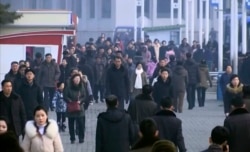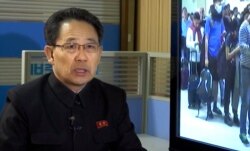North Korea’s medical system for coping with contagious diseases like the coronavirus is prioritized to protect the elites of the regime in Pyongyang and is unequipped to treat its local citizens, said a former North Korean medical doctor.
Choi Jung-hoon, a North Korean defector who is now a research professor at Korea University’s Public Policy Research Institute in Seoul, said North Korea is making “a big fuss” about the virus because its medical care system is unfit to take necessary measures to contain it.
Choi said instructions for taking sanitary and quarantine measures from North Korean leader Kim Jong Un are handed down to local leaders. But, he said, there are problems implementing them at the provincial level because rudimentary medical facilities are ill-equipped and the medical infrastructure is focused on Pyongyang.
Priority Pyongyang
“The purpose of fighting contagious diseases is different in North Korea compared to other countries,” Choi said. “In South Korea or the U.S., the measures are taken for the health and safety of its citizens. But in North Korea, priority is given to the leading members of the government in Pyongyang.”
Choi was in charge of implementing measures to contain contagious diseases at the sanitation unit of the Chongjin Railway Bureau before defecting to South Korea in 2012.
He began working there after studying clinical medicine at the Chongjin Medical University in North Korea’s third-largest city, Chongjin, which is in the northeastern province of North Hamgyong.
Quarantine measures
North Korea has taken all-out measures to prevent the fatal coronavirus from entering the country as the number of confirmed cases and deaths rise quickly in China, where the fast-spreading respiratory disease was first reported in the city of Wuhan. As of Friday, there were no known confirmed coronavirus cases reported in North Korea.
Calling its effort to keep the virus at bay a matter of “national existence” in January, North Korea temporarily closed the border it shares with China on Jan. 22 and suspended all air and train routes to China on Jan. 31.
North Korea took quarantine measures by banning new foreign diplomats from entering the country earlier this week.
The regime also set up various “emergency anti-epidemic headquarters” across the country as “a campaign to arouse all the masses to the work of preventing the novel coronavirus infection,” North Korea’s state media Korean Central News Agency said Wednesday.
Announcement vs. reality
Choi said even though North Korea announces such measures when infectious diseases break out, what actually happens at local levels is altogether different.
“When there is an outbreak of an infectious disease in North Korea, only Pyongyang is completely protected (quarantined),” Choi said.
“All railroads and roads heading to Pyongyang are blocked. The regime does not take proper measures [to protect] North Korean residents who make their daily living by relying on these roads to travel to various regions, which places them in worse situations,” he added.
Choi said North Korea is not equipped with tools to diagnose or treat outbreaks like the coronavirus might cause.
“North Korea’s medical system is poor, as the world probably knows,” Choi said. “It does not have proper medical equipment, let alone reliable electricity or water supply facilities in hospitals and health centers.”
As there is probably nothing that doctors could do to diagnose or treat those infected with a contagious disease like the coronavirus, people would be left on their own to cope with the outbreak, Choi said.
Cases likely to be concealed
If there are cases of the virus, North Korea will try to conceal them, instead of seeking help from international organizations such as the World Health Organization (WHO) or from the South Korean government, Choi said.
“Because North Korea tries to put up an image of having the best ‘self-sufficient’ medical science to treat and prevent infectious diseases through propaganda, the regime is reluctant to announce any outbreak publicly,” he said.
He believes that there could be a coronavirus outbreak in North Korea.
“It is impossible to have closed off all roads connecting to China,” he said. “The new coronavirus could have entered the country through smugglers” traveling across the border as viruses arrived in the past.
Choi said North Korea needs to seek help from the international community by sharing its health and medical information and focus on improving its medical science to help its people rather than focusing on developing nuclear weapons and missiles to maintain the regime security.
Christy Lee contributed to this report which originated in VOA’s Korean Service.






